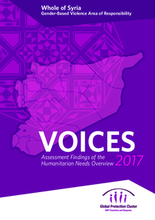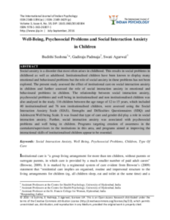Displaying 311 - 320 of 523
This study tests an intervention to improve child welfare outcomes for substance abusing families, specifically the probability of families achieving a stable (at least 12 months) reunification.
The report highlights the constant threat of sexual violence, exploitation, and child marriage that adolescents and girls face in Syria.
This study examines the experiences of young female survivors of sexual violence in northern Uganda in order to explore the variety of roles (both positive and negative) that informal support networks played in contributing to survivors’ healing, recovery, and reintegration.
This article discusses how the resilience of foster children can be increassed, and their outcomes changed through the responsible and intentional interventions of health care professionals, child welfare workers, and communities.
This study assesses the effects of institutional care on social interaction anxiety in children and further assesses the role of social interaction anxiety in emotional and behavioral problems in children.
The aim of this component of a preliminary cross-national study (Ireland and Catalonia) of care leavers' experience in the world of work is to explore how carers may influence the entry of young people in care into the world of work and how they may also influence the young people's progress in that world.
The purpose of this article is to provide psychologists and adoption researchers with a conceptual model for the psychosocial adjustment of foster care adoptees with a background of maltreatment.
Using the DFID sustainable livelihood approach, this qualitative study evaluated the social capital being accessed by adolescent girls transitioning from two institutions in Harare, Zimbabwe.
This study was aimed to identify adjustment problems of adolescents residing in an orphanage in Kerala, India, as well as to find out the association between adjustment problems of adolescents residing at orphanage with their socio-demographic variables.
In this study, clinical program directors from 59 residential treatment facilities in the US responded to an online survey addressing the representation of adopted youth currently being served by their organization, the extent to which adoption issues are incorporated into clinical intake and treatment processes, and the training needs of clinical staff related to adoption.


